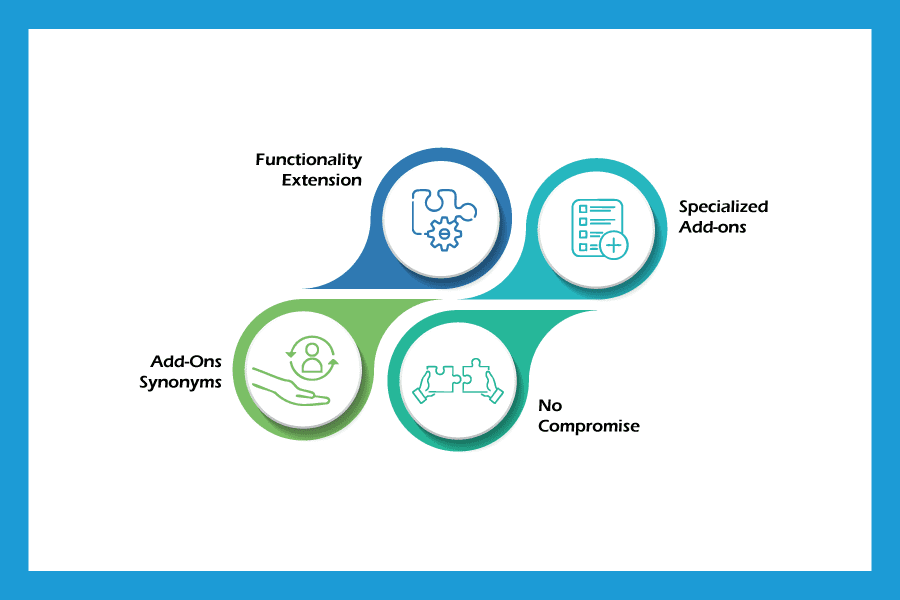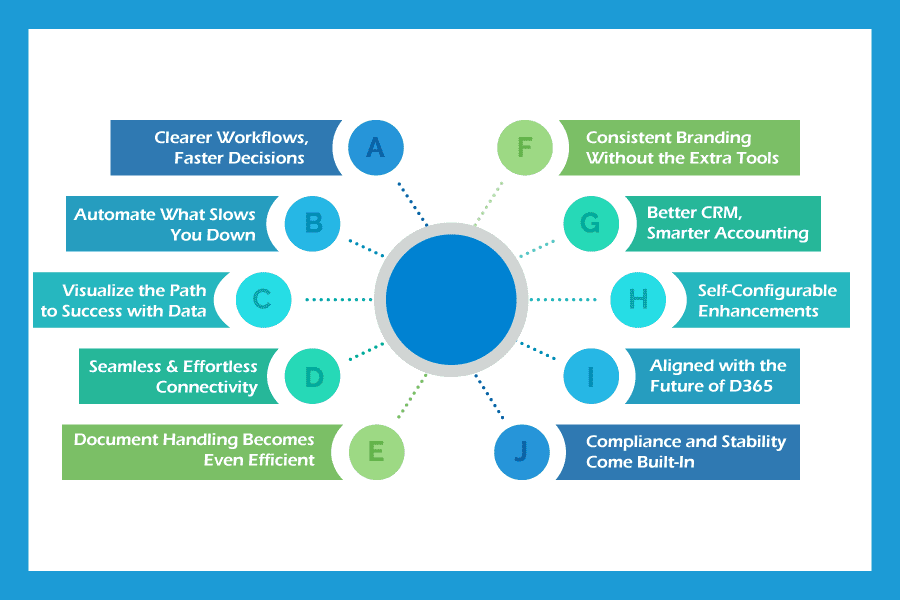
Your CRM user experience is about to touch newer heights — get ready to master Dynamics 365 CRM like never before!
Microsoft Dynamics 365, also known as D365, stands out as a popular tool used by organizations of all sizes to achieve growth through the efficient management of their operations. Since its introduction in 2005, this versatile tool has been utilized by businesses worldwide to streamline operations and drive growth. Integrating CRM and ERP functionalities enables the achievement of both short-term and long-term goals.
Recent innovations, such as Copilot, have further enhanced its appeal. Despite its robust features, businesses often require customization to meet unique needs. Add-ons play a crucial role here, enabling users to tailor D365 to their specific preferences and effectively address unique business needs.
In this blog post, we will provide you with a comprehensive guide on how Microsoft Dynamics 365 add-ons enhance CRM efficiency.
What Exactly are Add-Ons for Dynamics 365?
Add-ons refer to additional tools or extensions that can be integrated seamlessly with the software. These tools are designed to enhance and extend the functionalities already present in the program or platforms such as Dynamics 365 CRM. Basically, it provides users the flexibility to tailor the system to their specific needs.
In layman’s terms, add-ons are like the cherry on top of your favourite ice cream, adding that extra burst of flavour and uniqueness. These supplemental powerhouses not only amplify the platform’s capabilities but also bridge the gap between what Dynamics offers and what your organization envisions.
General Characterization of Add-Ons

- Functionality Extension: They are designed to work like specialised plugins, introducing new features, refining existing ones, or addressing niche requirements that the out-of-the-box features might not fully cover.
- Specialized Add-ons: There’s likely an Add-on that can meet your specific requirements, whether you want to enhance reporting capabilities, streamline customer contacts, or simplify complex business procedures.
- No Compromise: Notably, you may obtain all additional benefits without ever sacrificing security, stability, performance, or even Microsoft support compliance.
- Add-Ons Synonyms: Additionally, if someone refers to the Microsoft Dynamics 365 add-ons as plug-ins, extensions, productivity accelerators, or add-ins, don’t be misled; they are all common phrases for the same thing.
Also Read: Top 10 Microsoft Dynamics CRM addons to boost CRM Productivity
How Add-Ons Enhance CRM Functionality?

With clarity in mind about what add-ons are, now let’s go a step further and understand how these add-ons can make your existing Microsoft Dynamics 365 solution more productive:
Clearer Workflows, Faster Decisions
- When information is organized in long lists and tabs, productivity decreases. With add-ons, organizations can easily tailor their workflows to match their specific business processes.
- This enables businesses to achieve greater productivity and efficiency, fostering a more agile and responsive operational environment.
- That’s why visual tools like our Kanban board and Activity Timeline Accelerator make a difference. You don’t just “view” your pipeline—you understand it in seconds, making your follow-ups faster and your process tighter.
Automate What Slows You Down
- Manual work accumulates—especially in growing teams. While CRM software includes automation features, add-ons are still utilized for more detailed tasks, such as generating in-depth reports.
- For instance, Dynamics 365 CRM users can utilize the Report Scheduler automation add-on to efficiently produce detailed reports.
- While Auto-counter add-ons help in automating manual tasks like Report Scheduler and Auto Counter Add-on , they automate and improve such processes – which usually saves time like 4-6 hours per week.
Visualize the Path to Success with Data
- Add-ons elevate the analytical capabilities of Microsoft Dynamics 365 solutions by offering advanced tools for in-depth data analysis.
- With add-ons, users can identify trends, patterns, and outliers, providing decision-makers with deeper insights.
- This feature allows users to gain a quicker and more precise insight into activities. Just like Soluzione’s Activity Timeline Accelerator Add-On for D365, which offers an innovative and interactive timeline view for both standard and custom entities.
Explore More: Activity Timeline for Dynamics CRM 365
Seamless & Effortless Connectivity
- Add-ons seamlessly integrate with Dynamics 365, creating a unified ecosystem where data flows effortlessly.
- Foster connectivity across various business functions for a holistic approach to operations.
- For example, Soluzione’s Accounting Connectors offer Bi-Directional Integration for Dynamics 365 CRM, addressing challenges for organizations that utilize D365 alongside accounting software such as Xero, MYOB, or QuickBooks.
Document Handling Becomes Even Efficient
- Add-ons enhance document management, facilitating efficient storage, retrieval, and collaboration on critical documents.
- Add-ons also provide version control and audit trails for document accuracy, compliance, and accountability.
- One such add-on is the SharePoint Metadata Capture for Dynamics 365 by Soluzione. It automates the capture of all document metadata upon uploading to SharePoint from D365.
Consistent Branding Without the Extra Tools
- Scale and customize Dynamics 365 to meet evolving requirements, ensuring the platform grows in tandem with the business. Add-ons, such as the feature-rich D365 CRM, enable you to effortlessly create customized emails and templates that meet your business needs.
- Our HTML Email Template Editor solves that. Create responsive, brand-aligned email campaigns inside Dynamics 365 CRM.
Better CRM, Smarter Accounting
- Add-ons can help make financial syncing seamless; usually, it’s difficult to sync the CRM and other accounting tools.
- Our accounting connectors for Xero, MYOB, and QuickBooks bridge the gap, automate record sync, reduce reconciliation errors, and give you cleaner, real-time financial visibility—without needing to export/import manually.
Self-Configurable Enhancements
- Traditional CRM changes often involve a long dev cycle. With Microsoft Dynamics 365 add-ons, various configurations—such as templates, workflows, and metadata—can be managed without requiring code.
- This means marketing, operations, and even support teams can make changes on the go, keeping your Microsoft Dynamics 365 CRM agile without creating an IT backlog.
Aligned with the Future of D365
- Many modern D365 add-ons are built to fully align with the latest Microsoft Dynamics 365 implementations, including Copilot, tighter Power Platform integrations, and new UI updates.
- That means you avoid disruptions, retraining, or downtime every time Microsoft rolls out an upgrade.
Compliance and Stability Come Built-In
- The best Microsoft Dynamics 365 add-ons are developed to align with Microsoft’s own standards, ensuring encryption, stability, and audit-readiness are built in.
- Compliance in add-ons is especially valuable for industries with strict regulatory needs—like finance, healthcare, and public services—where CRM performance and trust go hand in hand.
Unlocking a New Era of Possibilities with Dynamics 365…
Opportunities and challenges are endless, and settling for the status quo is no longer an option. As organizations grow, so do their operational needs—and Microsoft Dynamics 365 add-ons offer a practical way to bridge that gap. The right add-ons don’t just “add features”—they unlock agility, save time, reduce overhead, and help you tailor Microsoft Dynamics 365 CRM to fit your real-world challenges.
And if you’re exploring options, it’s worth partnering with those who understand both the technical and business aspects of CRM. Among these Microsoft Dynamics 365 partners, Soluzione’s IT service is one such option. Just like their other services, their commitment to providing Dynamics 365 add-ons goes beyond meeting requirements; offering precisely what you need, exactly when you need it, and within your specified budget.
Related Posts
Accounting Software Integration with Dynamics 365 CRM
Microsoft Dynamics CRM On-Premise To Online Migration
Kanban Board for Dynamics 365 – Complete Configuration
Read More: https://www.solzit.com/blog/
Frequently Asked Questions
How do Dynamics 365 plugins work?
Dynamics 365 plugins amplify the platform's capabilities and bridge the gap between what Dynamics offers and what your organization envisions. These plugins add new features, refine existing ones, or address niche requirements that might not be fully covered by the default features.
What are extensions in D365?
In Dynamics 365, extensions refer to additional tools and functionalities that can be seamlessly integrated with the platform to extend its capabilities. These extensions, often known as add-ons, offer a customizable and flexible approach to enhance Dynamics CRM. It thus allows users to tailor their CRM experience based on specific preferences and unique business requirements.
What is the difference between overlay and extension in D365?
The key difference lies in the method of customization. Overlay involves directly modifying the existing elements, while extension involves creating separate, additional components to enhance functionality. Extensions are often preferred for their modularity, ease of maintenance, and reduced risk of conflicts during system updates or upgrades.
Are productivity Add-Ons compatible with all versions of Dynamics 365?
While most modern productivity add-ons are compatible with Dynamics 365, not all versions are supported. This is because some add-ons are designed for specific versions, licenses, and modules. To ensure the same, we recommend that you first assess version compatibility during the Dynamics 365 implementation or upgrade phase to avoid any inconvenience.
Do these Add-Ons require technical expertise for installation and configuration?
Generally, Add-Ons don’t require technical expertise for installation and configuration. However, in some add-ons, though they are user-friendly, they need basic familiarity with the system to install or grant specific permissions accordingly. You can seek the assistance of a Dynamics 365 consultant or administrator for a smoother rollout and to avoid common misconfigurations.
How can I determine which Add-Ons will best suit my business operations?
The easiest way is self-assessment of bottlenecks or repetitive tasks within your current CRM processes. From there, match those needs with purpose-built D365 add-ons that target those pain points. Still, if you’re not sure, consider a brief session with a Microsoft Dynamics 365 consulting services expert who has a deeper understanding of CRM, as well as add-ons and their business relevance, to help you shortlist the right add-ons for your business.
What are the cost implications of implementing productivity Add-Ons in Dynamics 365?
Usually, add-ons are more affordable than customizing or developing a software solution. These can be availed at one time or through a subscription-based pricing model. The cost usually depends on the complexity, licensing model, and support options. So it can range from a thousand dollars to a hundred dollars, depending on the factors given.










